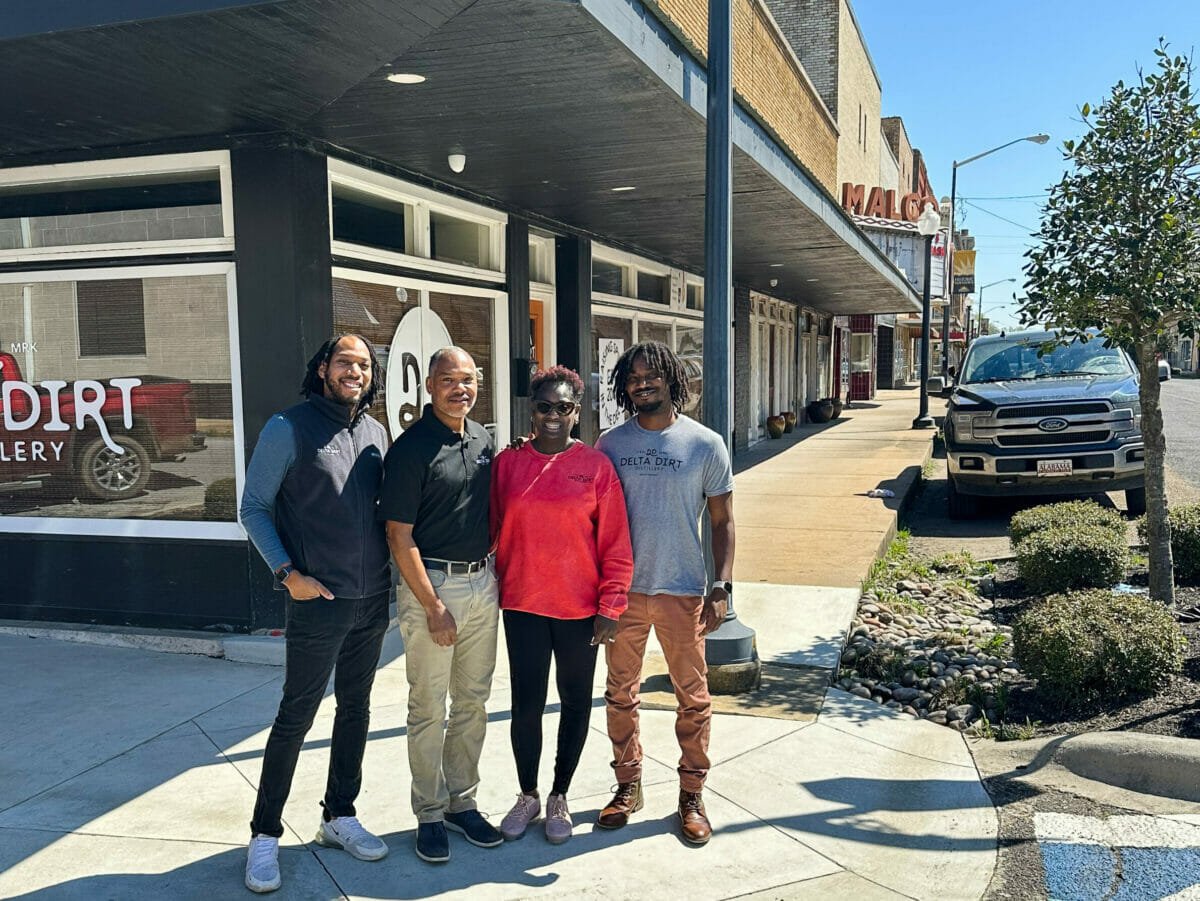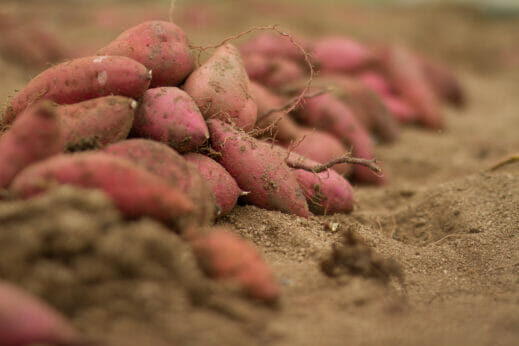Meet the Arkansas Farmers Turning Sweet Potatoes into Spirits
The Williams family has maintained its Black-owned farming operation for four generations, thanks to a penchant for diversification.
Meet the Arkansas Farmers Turning Sweet Potatoes into Spirits
The Williams family has maintained its Black-owned farming operation for four generations, thanks to a penchant for diversification.

From left: Thomas, Harvey Jr., Donna, and Donavan Williams.courtesy of Thomas Williams.
The rich soil of the Arkansas Delta takes its minerals from the Mississippi River that winds in circuitous patterns between the state and its neighboring namesake. Prime farmland, it attracted countless farmers, including the Black farmers seeking to fulfill the promise of “40 acres and a mule” that followed the American Civil War. But Black farm ownership has dropped dramatically over the years, with just 1,500 estimated to remain in Arkansas today. Among those is the Williams family farm, a fourth-generation operation that has been able to beat the odds and find inspiration in an unlikely place: its own fields.
Sharecropper Joe Williams raised his family on a cotton and corn farm before passing it on to his son, UD, who was able to purchase the farm in 1949 thanks to the money he earned from cotton and homemade moonshine. It’s still run by the family today, now growing 100 acres of mostly sweet potatoes, the warm-climate vegetable that is an important staple in African American foodways.
But the process hasn’t always come easily. After the Civil War, the sharecropping period often involved predatory practices, including low wages and unsafe conditions. Landowners collected rent for the land as well as a percentage of the crops, while the farmers who worked it received only a small amount. In 1919, a nearby town in the Arkansas Delta was the site of the Elaine Massacre where hundreds were killed in a conflict that stemmed from a labor union meeting of Black sharecroppers.
By the late 1980s, farming became more difficult as equipment and material costs rose, causing many to close, including farmers. The USDA loan program was another source of discrimination as Black farmers were denied assistance for arbitrary reasons, resulting in the class-action lawsuit Pigford v. Glickman in 1999.
“Many farmers, especially Black farmers, got out of farming at that time or diversified … My dad chose to diversify and change over to more vegetable farming,” says Harvey Williams, the fourth-generation farmer who currently manages the farm with his brothers Andre and Kennard.
“I’m really grateful and proud that my dad was able to find a way to make a living with our small acres and his limited resources,” says Williams. “At the same time, I’m saddened that so many other Black farmers in the Delta were not as fortunate. Their reasons and conditions may vary, but the result ended the same—thousands of acres and hundreds of Black families are no longer living on nor farming their ancestral land.”

Williams took time away from the farm, taking a corporate job and moving across the country, then returned to Arkansas in 2016 to work for a company around two hours from Helena. But he still felt connected to the family business.
“I wanted to do something tied to the farm, and I didn’t know what that was going to look like. I just didn’t want to do traditional… I don’t know, crop farming, just driving tractors every day.”
His brother and late father, Harvey Sr., continued to farm sweet potatoes and, while at a 2016 farming conference, they learned about a farm in North Carolina producing sweet potato vodka.
“I got really intrigued and said, ‘We should do that.’ My brother was trying to get me to go into sweet potato pies and other things, but I really thought it would be a unique opportunity to produce a sweet potato vodka,” says Williams. “There’s not many on the market.”
He soon found out why that was the case when launching Delta Dirt Distillery, the first Black-owned distillery in the state.
“The process of extracting the fermentable sugars out of sweet potatoes is not an easy one. So we put a lot of effort into figuring that out,” says Williams, noting that it’s not as straightforward as producing vodka. “With sweet potatoes, the nuances really reside in the cook and mash processes. Sweet potatoes are known to be a hearty and nutritious vegetable, and the sugars extracted from them lend a unique and delightful hint of earthy sweetness to our vodka.”

One thing working in the company’s favor is the fact that they grow their own sweet potatoes, allowing them to control the costs and quality.
“With enough research and effort, we figured out a way to create this product out of sweet potatoes and our corn. We grow both of those raw ingredients, which makes it even better,” he says. “We enlisted the help of industry consultants and a university professor. I still admit that sweet potatoes are not the easiest source for producing alcohol, but, over time, we were able to develop a process that met our expectations of delivering decent yields and exceptional taste.”
The Williams family bought a building in the quiet stretch of downtown Helena in 2017 and set about converting it into a distillery. The pandemic threw a wrench in their plans, but it gave them time to perfect their recipe, testing various methods until they produced a bottle that met their expectations in December of 2020. The tasting room followed, opening in April of 2021.
“People that come in will say, ‘Man, this doesn’t feel like Helena’ or, “This is something that could be in downtown New York,’” says Williams.

The distillery has also benefited from community support as the pandemic allowed locals to see the progress and interest grew through word of mouth.
“They have really embraced the business. Not initially, especially the locals, they didn’t know what it was,’” he says. “Now we have a regular crowd that comes in, mostly on Friday evenings, and then the rest of the weekend, Saturday and Sunday, we have people from all over the state, and in some cases, all over the country, come and check us out.”
In addition to the original sweet potato vodka, which won Double Gold in the 2022 San Francisco World Spirits Competition, Delta Dirt also has gin and bourbon, all of which are available in Arkansas and parts of Texas, Mississippi, Pennsylvania and Tennessee.
The distillery is now a family operation, with Harvey’s wife Donna and sons Thomas and Donavan as head distiller and operations manager, respectively. Not only was the family able to diversify its agricultural offerings, but it has also continued the legacy started by Joe Williams to be passed onto the next generation.
“It was originally 86 acres, and we’ve kept that land,” says Williams.
Follow us
This work is licensed under a Creative Commons Attribution-NoDerivatives 4.0 International License.
Want to republish a Modern Farmer story?
We are happy for Modern Farmer stories to be shared, and encourage you to republish our articles for your audience. When doing so, we ask that you follow these guidelines:
Please credit us and our writers
For the author byline, please use “Author Name, Modern Farmer.” At the top of our stories, if on the web, please include this text and link: “This story was originally published by Modern Farmer.”
Please make sure to include a link back to either our home page or the article URL.
At the bottom of the story, please include the following text:
“Modern Farmer is a nonprofit initiative dedicated to raising awareness and catalyzing action at the intersection of food, agriculture, and society. Read more at <link>Modern Farmer</link>.”
Use our widget
We’d like to be able to track our stories, so we ask that if you republish our content, you do so using our widget (located on the left hand side of the article). The HTML code has a built-in tracker that tells us the data and domain where the story was published, as well as view counts.
Check the image requirements
It’s your responsibility to confirm you're licensed to republish images in our articles. Some images, such as those from commercial providers, don't allow their images to be republished without permission or payment. Copyright terms are generally listed in the image caption and attribution. You are welcome to omit our images or substitute with your own. Charts and interactive graphics follow the same rules.
Don’t change too much. Or, ask us first.
Articles must be republished in their entirety. It’s okay to change references to time (“today” to “yesterday”) or location (“Iowa City, IA” to “here”). But please keep everything else the same.
If you feel strongly that a more material edit needs to be made, get in touch with us at [email protected]. We’re happy to discuss it with the original author, but we must have prior approval for changes before publication.
Special cases
Extracts. You may run the first few lines or paragraphs of the article and then say: “Read the full article at Modern Farmer” with a link back to the original article.
Quotes. You may quote authors provided you include a link back to the article URL.
Translations. These require writer approval. To inquire about translation of a Modern Farmer article, contact us at [email protected]
Signed consent / copyright release forms. These are not required, provided you are following these guidelines.
Print. Articles can be republished in print under these same rules, with the exception that you do not need to include the links.
Tag us
When sharing the story on social media, please tag us using the following: - Twitter (@ModFarm) - Facebook (@ModernFarmerMedia) - Instagram (@modfarm)
Use our content respectfully
Modern Farmer is a nonprofit and as such we share our content for free and in good faith in order to reach new audiences. Respectfully,
No selling ads against our stories. It’s okay to put our stories on pages with ads.
Don’t republish our material wholesale, or automatically; you need to select stories to be republished individually.
You have no rights to sell, license, syndicate, or otherwise represent yourself as the authorized owner of our material to any third parties. This means that you cannot actively publish or submit our work for syndication to third party platforms or apps like Apple News or Google News. We understand that publishers cannot fully control when certain third parties automatically summarize or crawl content from publishers’ own sites.
Keep in touch
We want to hear from you if you love Modern Farmer content, have a collaboration idea, or anything else to share. As a nonprofit outlet, we work in service of our community and are always open to comments, feedback, and ideas. Contact us at [email protected].by Caroline Eubanks, Modern Farmer
June 30, 2023
Modern Farmer Weekly
Solutions Hub
Innovations, ideas and inspiration. Actionable solutions for a resilient food system.
ExploreShare With Us
We want to hear from Modern Farmer readers who have thoughtful commentary, actionable solutions, or helpful ideas to share.
SubmitNecessary cookies are absolutely essential for the website to function properly. This category only includes cookies that ensures basic functionalities and security features of the website. These cookies do not store any personal information.
Any cookies that may not be particularly necessary for the website to function and are used specifically to collect user personal data via analytics, ads, other embedded contents are termed as non-necessary cookies.